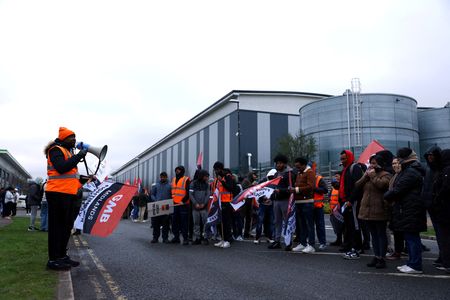By James Davey
LONDON (Reuters) -A British union has narrowly failed to secure the right to formally represent workers at an Amazon warehouse, with staff rejecting the chance to become the first site outside the U.S. to force the ecommerce company to negotiate labour terms.
The GMB union said 49.5% of the 2,600 workers who voted backed union recognition at the distribution site in Coventry, central England, falling just short of a majority required in a blow for the UK trade union movement.
The union said Amazon deliberately frustrated its recognition bid by recruiting hundreds of additional workers at the site and pressuring existing workers into cancelling their union membership so the union no longer had the numbers to make the ballot threshold. Charges Amazon rejects.
The union said Amazon would now face a legal challenge over what it said were “union-busting tactics”.
“This is just the beginning. Amazon now faces a legal challenge, while the fire lit by workers in Coventry and across the UK is still burning,” Stuart Richards, GMB senior organiser, said.
Amazon thanked everyone who voted in the ballot.
“Across Amazon, we place enormous value on engaging directly with our employees and having daily conversations with them. It’s an essential part of our work culture,” a spokesperson for the company said.
The Coventry workers have been involved in a dispute over pay and union recognition for more than a year, and have carried out numerous strikes at Amazon, which employs about 75,000 staff in the UK, making it one of the country’s top ten private sector employers. Amazon’s treatment of workers has been in the spotlight for years and it has historically opposed unionisation, saying its preference has been to resolve issues with employees directly. Its workers in Staten Island, New York, forced the company to recognise a trade union in the U.S. for the first time in 2022, although since then staff at two other New York warehouses and one in Alabama have voted against the move. Amazon says it interacts with unions on many aspects of its operations in several countries such as Italy and Germany – where it is required by law – as well as France, Spain and Canada.
Britain’s new Labour government has promised to give workers more rights and unions more power, saying current employment laws are outdated, a drag on economic growth and a major factor in the UK’s worst period of industrial relations since the 1980s.
It plans to update trade union legislation, removing restrictions on trade union activity and ensuring industrial relations are based around good faith negotiation and bargaining. But it is not clear yet how those proposals will unfold, and what it would mean for a company like Amazon.
(Reporting by James Davey; editing by Kate Holton, William James and Jane Merriman)





